Major Henry Charles David Marshall - Wallet 1 - Booklet 6 - Part 1
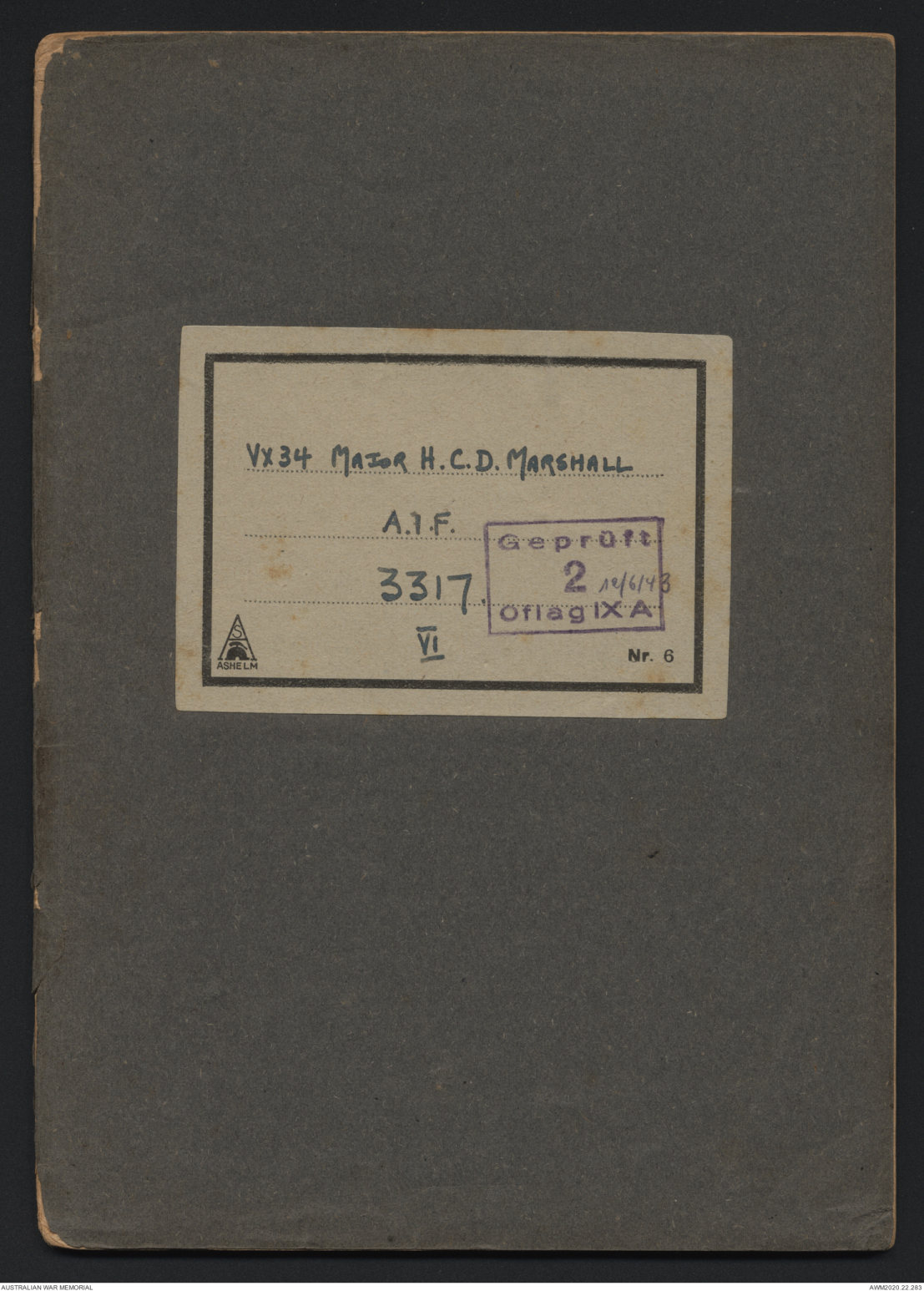
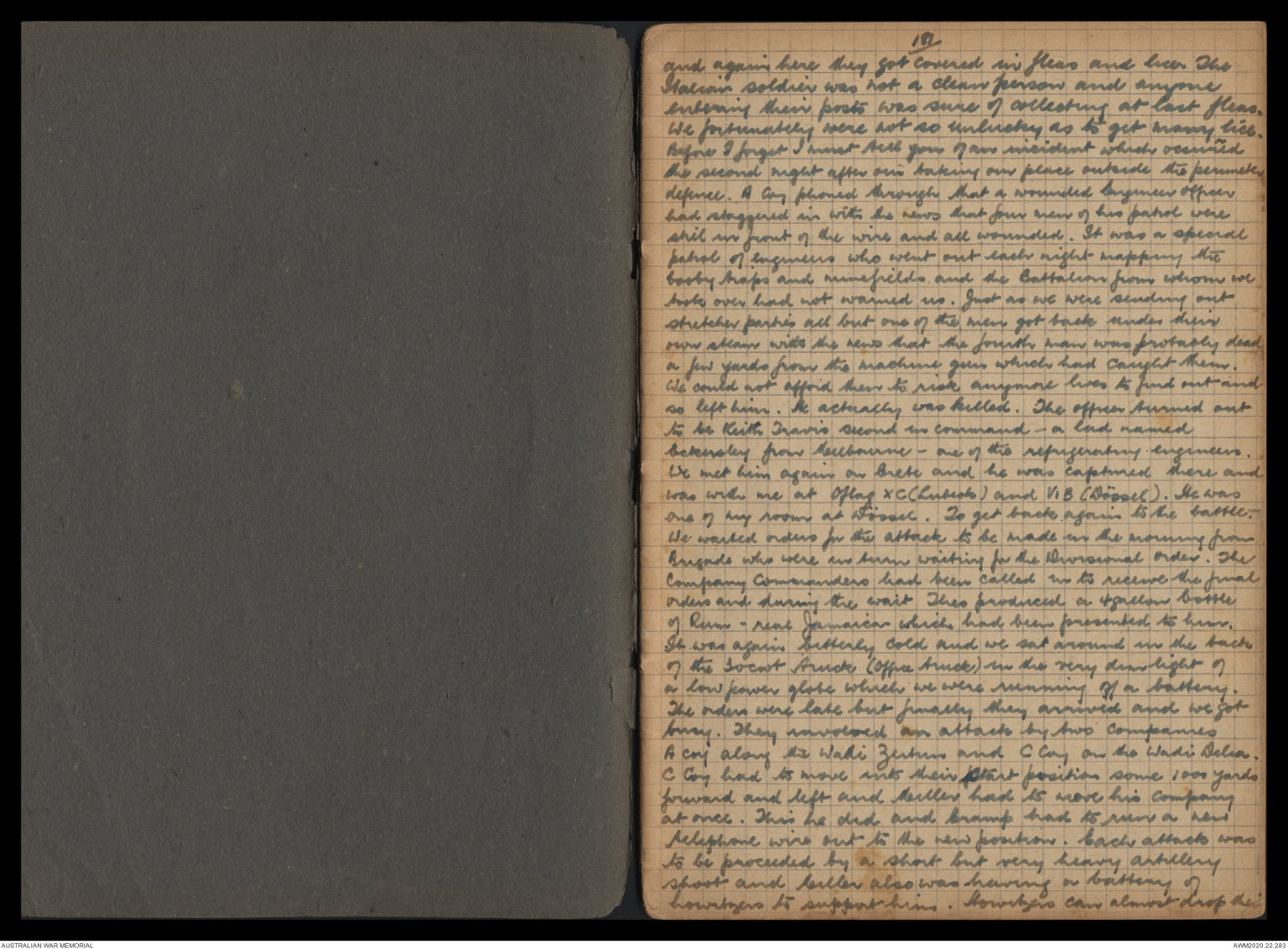
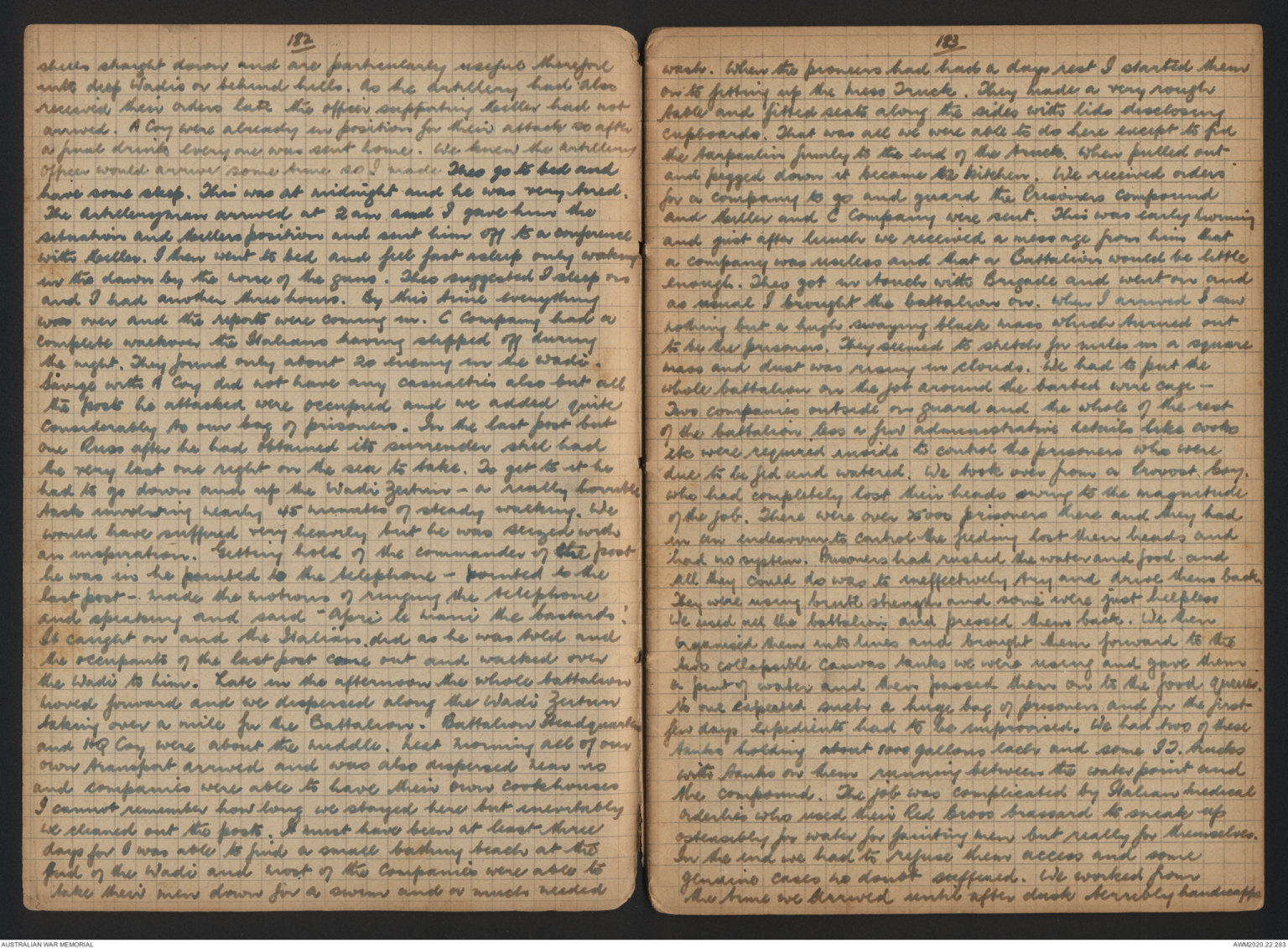
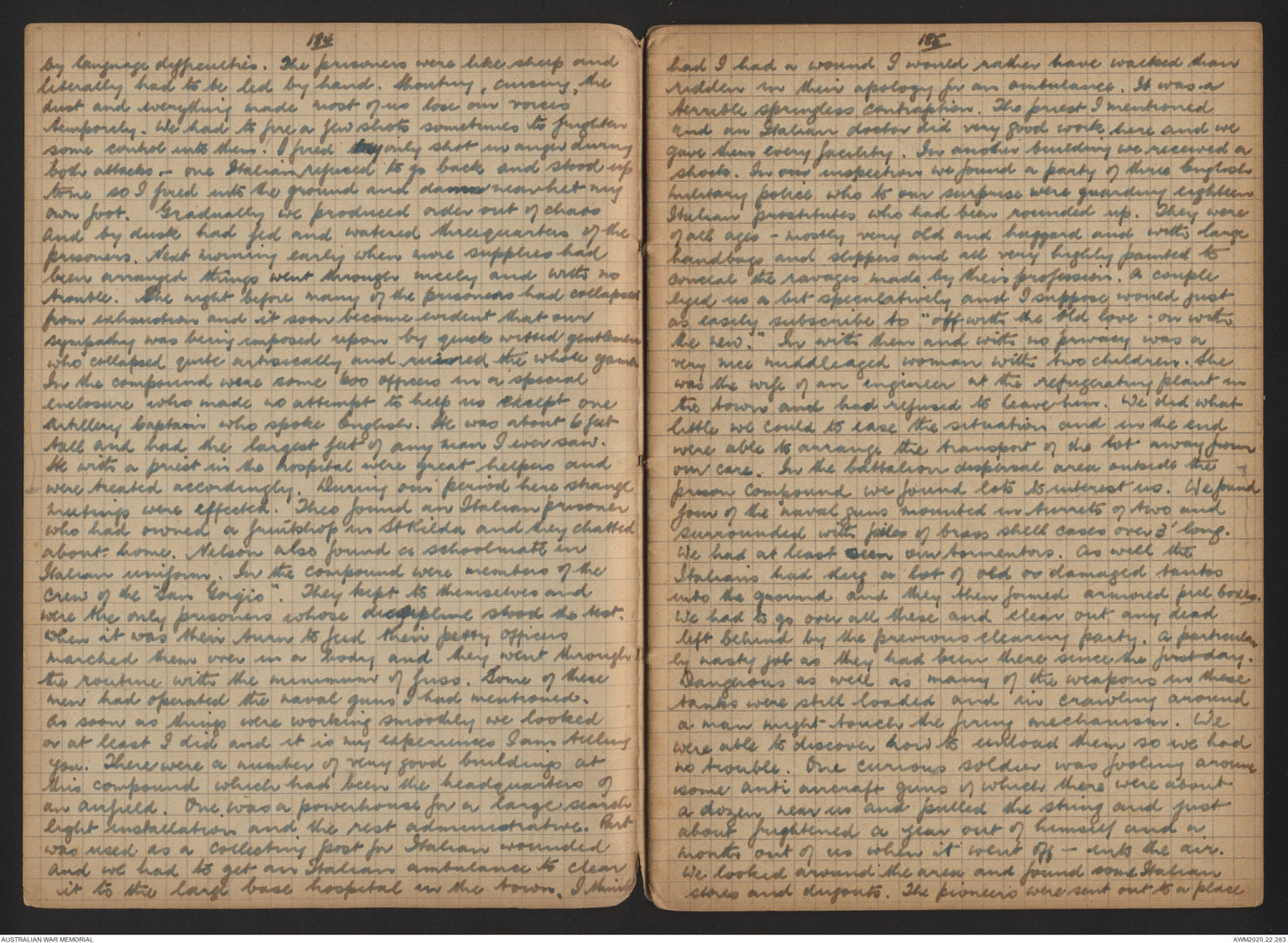
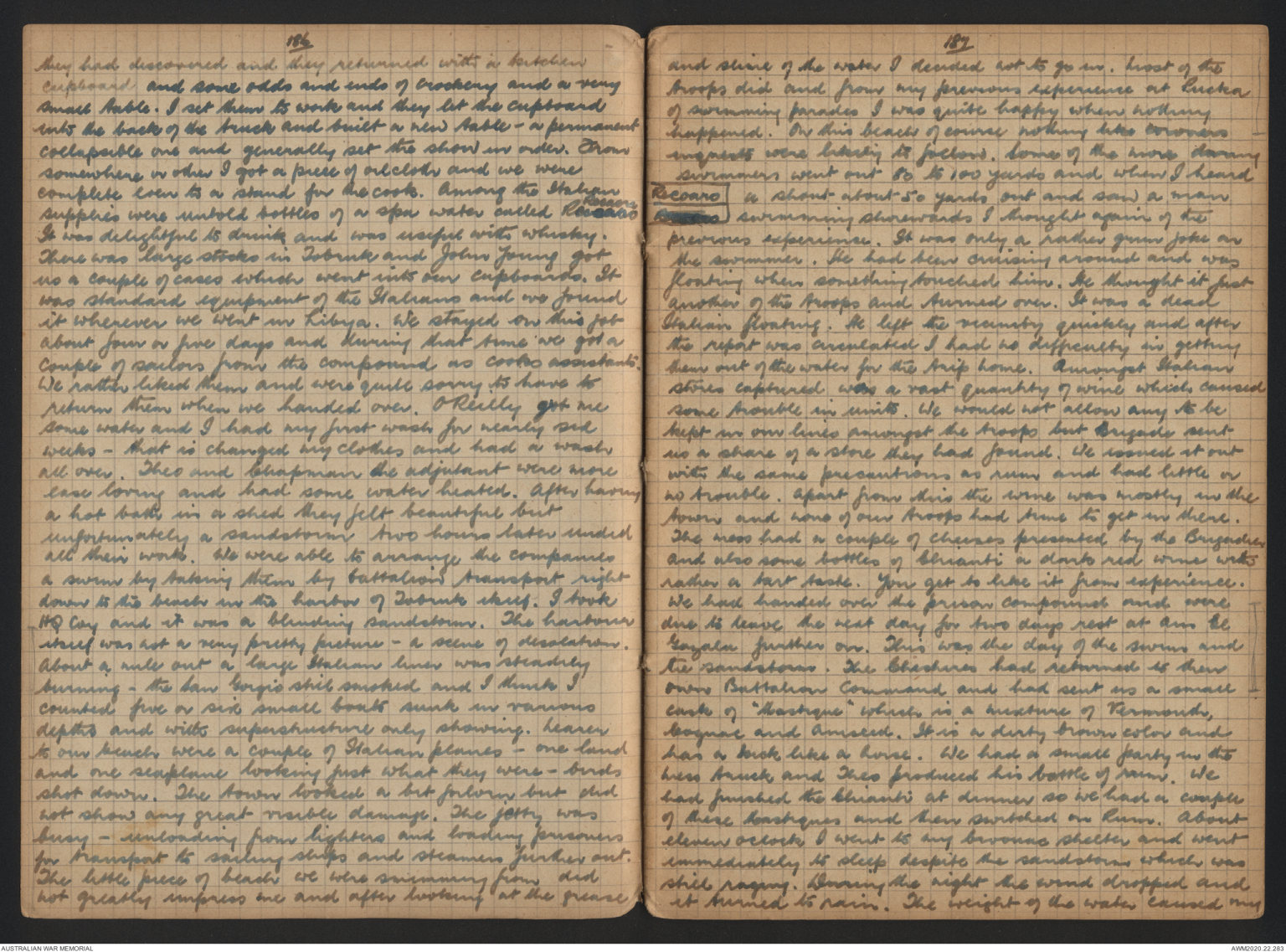
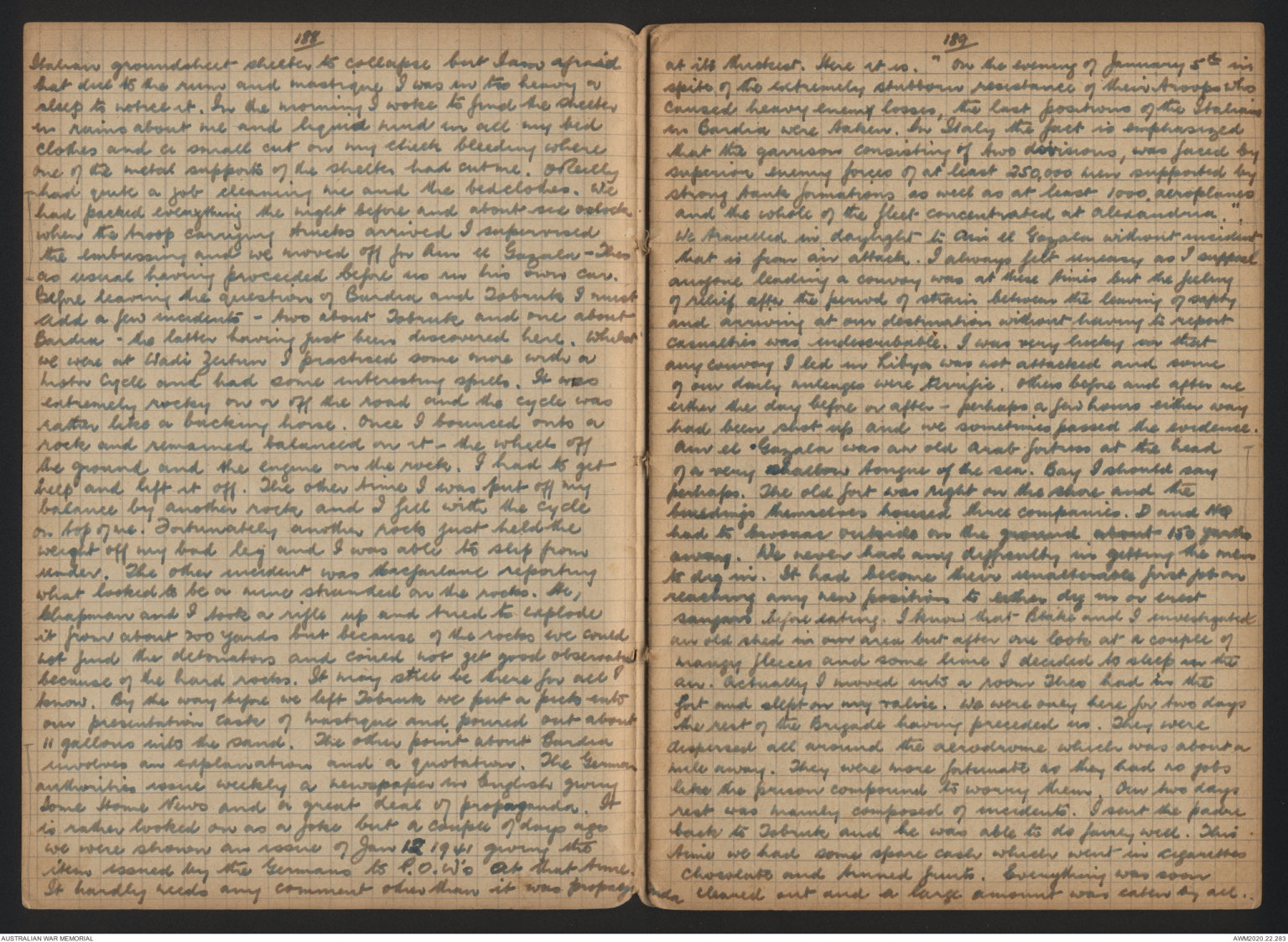
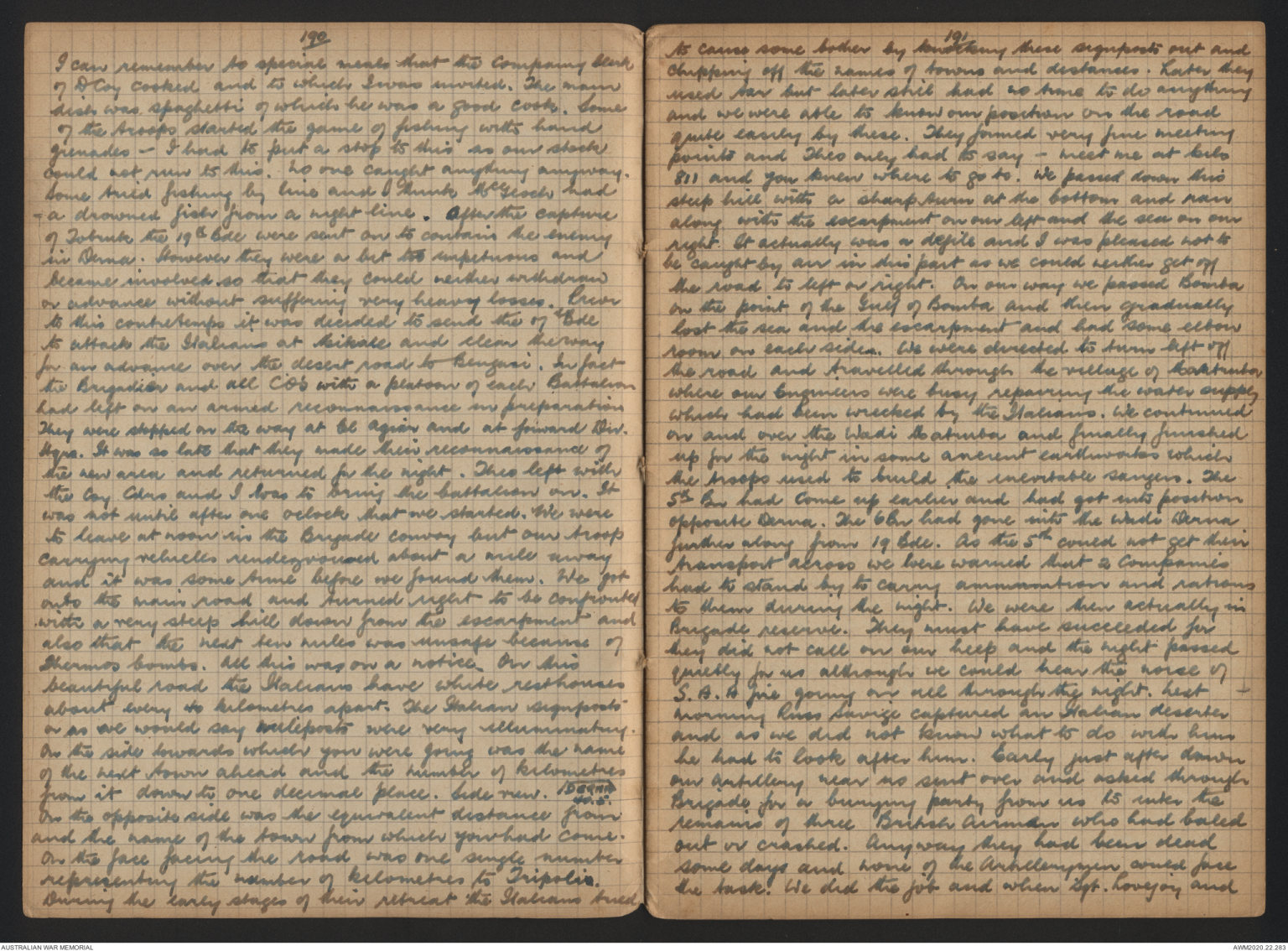
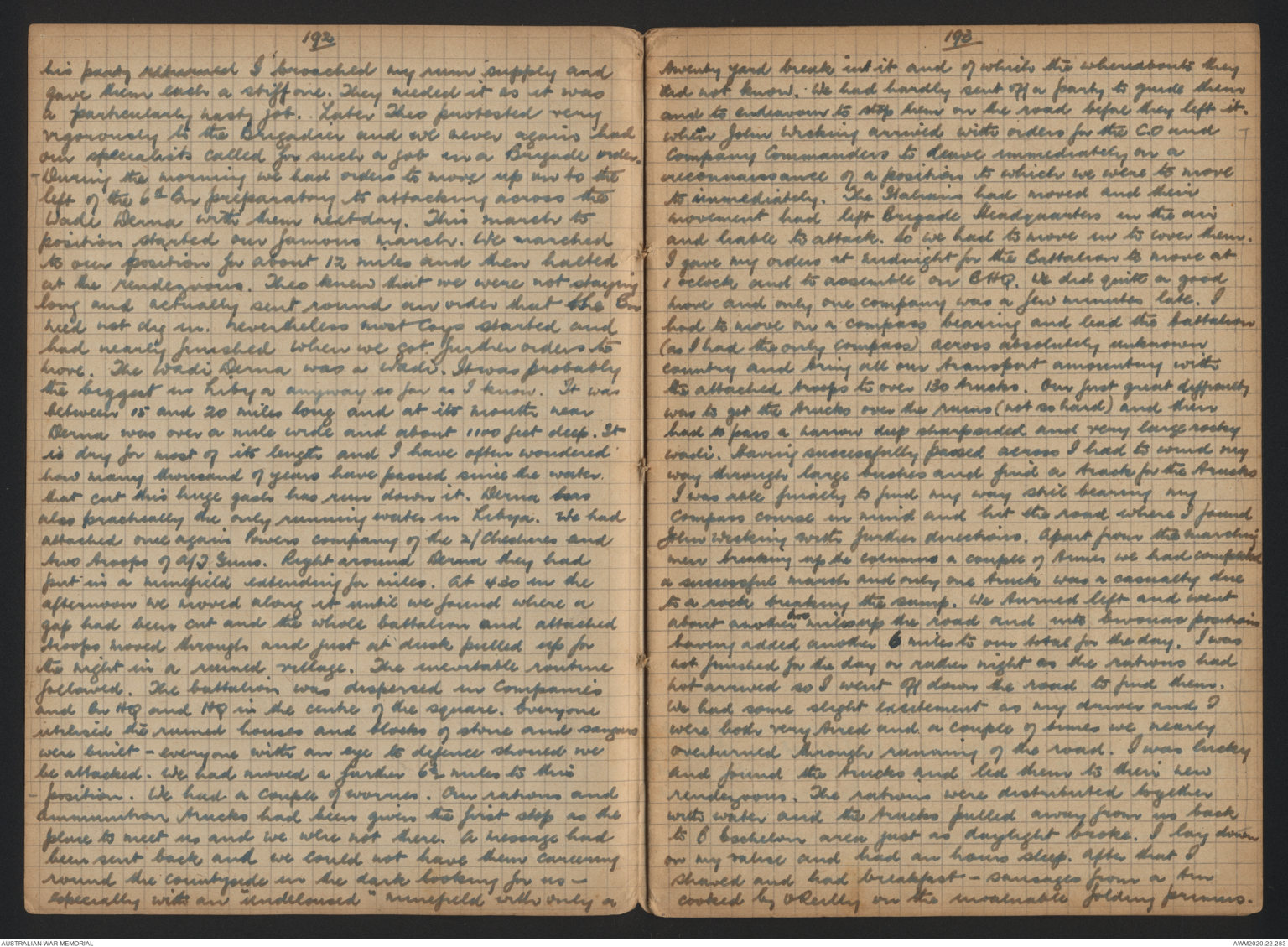
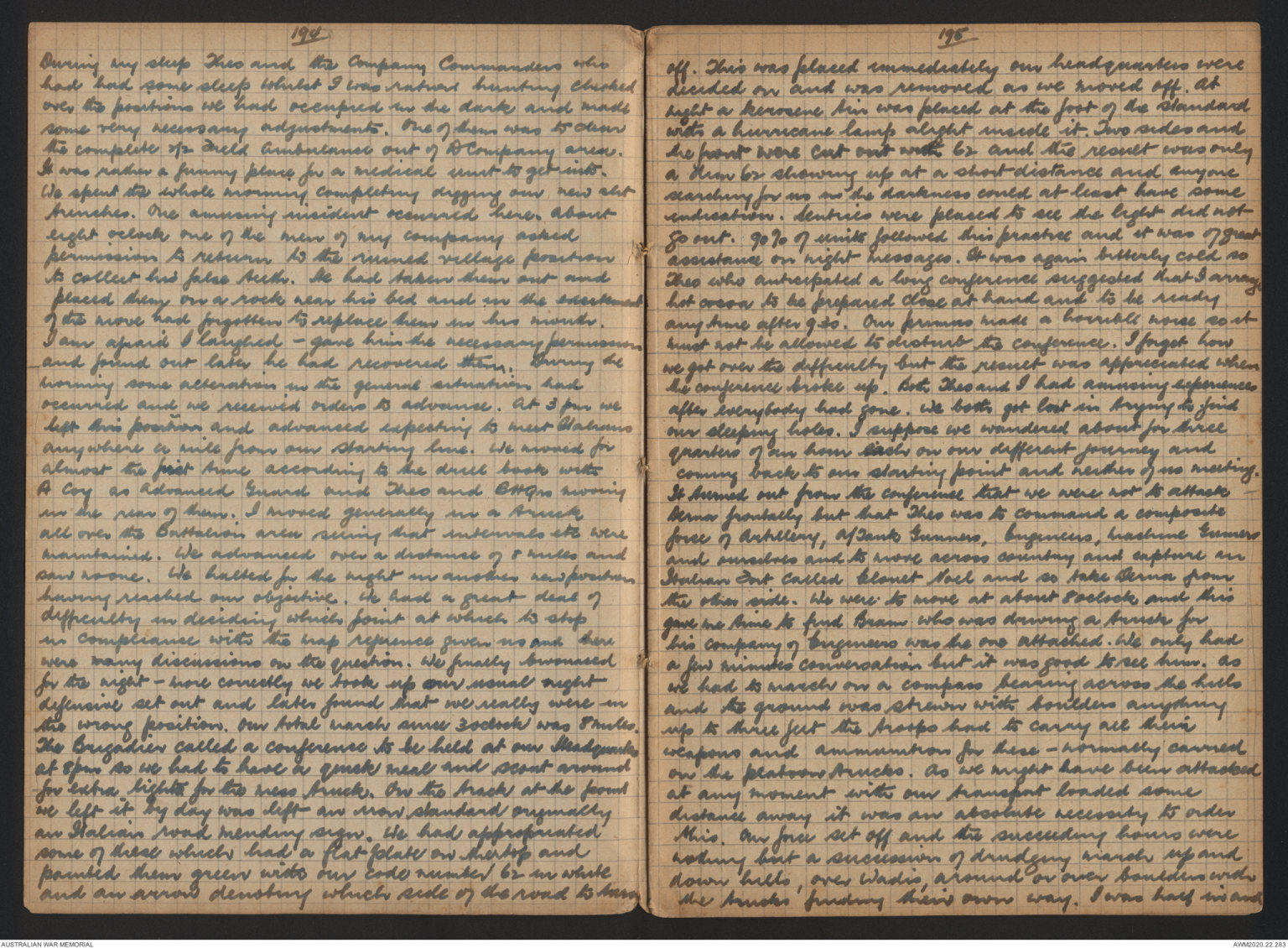
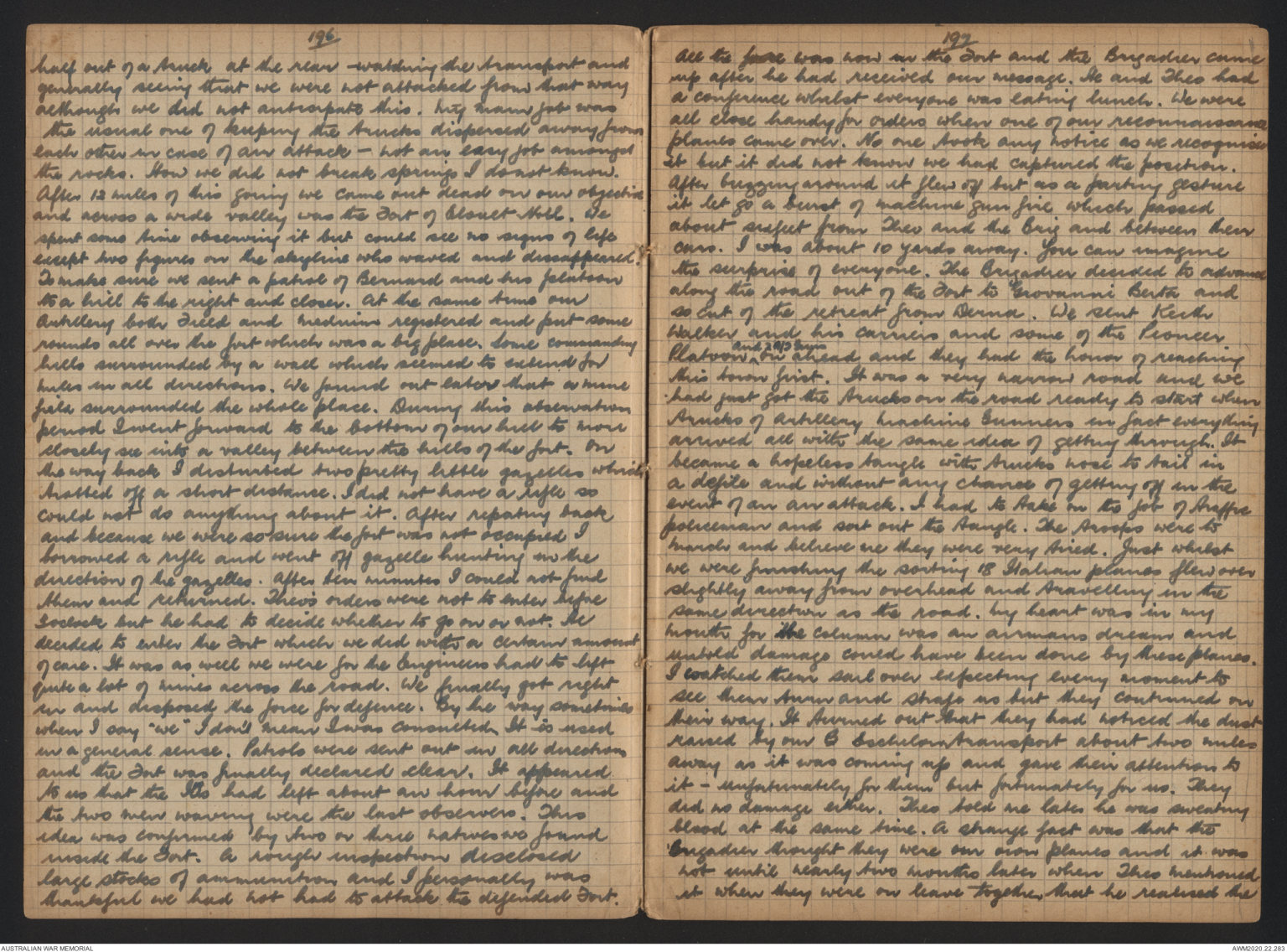
VX34 MAJOR H.C.D. MARSHALL
A.I.F.
3317.
VI
181
and again here they got covered in fleas and lice. The
Italian soldier was not a clean person and anyone
entering their posts was sure of collecting at last fleas.
We fortunately were not so unlucky as to get many lice.
Before I forget I must tell you of an incident which occur^red
the second night after our taking our place outside the perimeter
defence. A Coy phoned through that a wounded Engineer officer
had staggered in with the news that four men of his patrol were
still in front of the wire and all wounded. It was a special
patrol of engineers who went out each night mapping the
booby traps and minefields and the Battalion from whom we
took over had not warned us. Just as we were sending out
stretcher parties all but one of the men got back under their
own steam with the news that the fourth man was probably dead
a few yards from the machine gun which had caught them.
We could not afford then to risk anymore lives to find out and
so left him. He actually was killed. The officer turned out
to be Keith Travis second in command - a lad named
Eckersley from Melbourne- one of the refrigerating engineers.
We met him again on Crete and he was captured there and
was with me at Oflag XC (Lubeck) and VIB (Dossel). He was
one of my room at Dossel. To get back again to the battle.-
We waited orders for the attack to be made in the morning from
Brigade who were in turn waiting for the Divisional order. The
Company Commanders had been called in to receive the final
orders and during the wait Theo produced a 4 gallon bottle
of Rum - real Jamaican which had been presented to him.
It was again bitterly cold and we sat around in the back
of the 30 cwt Truck (office truck) in the very dim light of
a low power globe which we were running off a battery.
The orders were late but finally they arrived and we got
busy. They involved an attack by two companies
A coy along th e Wadi Zeitun and C Coy on the Wadi Delia.
C Coy had to move into their start position some 1000 yards
forward and left and Miller had to move his company
at once. This he did and Cramp had to run a new
telephone wire out to the new position. Each attack was
to be proceeded by a short but very heavy artillery
shoot and Miller also was having a battery of
howitzers to support him. Howitzers can almost drop their
182
shells straight down and are particularly useful therefore
into deep Wadis or behind hills. As the artillery had also
received their orders late the officer supporting Miller had not
arrived. A Coy were already in position for their attack so after
a final drink every one was sent home. We knew the artillery
officer would arrive some time so I made Theo go to bed and
have some sleep. This was at midnight and he was very tired.
The artilleryman arrived at 2 am and I gave him the
situation and Millers position and sent him off to a conference
with Miller. I then went to bed and fell fast asleep only waking
in the dawn by the noise of the guns. Theo suggested I sleep on
and I had another three hours. By this time everything
was over and the reports were coming in. C company had a
complete walkover the Italians having slipped off during
the night. They found only about 20 enemy in the wadi.
Savige with A Coy did not have any casualties also but all
the posts he attacked were occupied and we added quite
considerably to our bag of prisoners. In the last post but
one Russ after he had obtained its surrender still had
the very last one right on the sea to take. To get to it he
had to go down and up the Wadi Zeitun - a really horrible
task involving nearly 45 minutes of steady walking. We
would have suffered very heavily but he was seized with
an inspiration. Getting hold of the commander of the post
he was in he pointed to the telephone - pointed to the
last post - made the motions of ringing the telephone
and speaking and said Après le mani the bastards !
It caught on and the Italian did as he was told and
the occupants of the last post came out and walked over
the Wadi to him. Late in the afternoon the whole battalion
moved forward and we dispersed along the Wadi Zeitun
taking over a mile for the Battalion. Battalion Headquarters
and HQ Coy were about the middle .Next morning all of our
own transport arrived and was also dispersed near us
and companies were able to have their own cookhouses
I cannot remember how long we stayed here but inevitably
we cleaned out the posts. I must have been at least three
days for I was able to find a small bathing beach at the
end of the Wadi and most of the companies were able to
take their men down for a swim and a much needed
183
wash. When the prisoners had had a days rest I started them
on to fitting up the Mess Truck. They made a very rough
table and fitted seats along the sides with lids disclosing
cupbpards. That was all we were able to do here except to fit
the tarpaulin firmly to the end of the truck, when pulled out
and pegged down it becamethe kitchen. We received orders
for a company to go and guard the Prisoners compound
and Miller and C Company were sent. This was early morning
and just after lunch we received a message from him that
a company was useless and that a Battalion would be little
enough. Theo got in touch with Brigade and went on and
as usual I brought the battalion on. When I arrived I saw
nothing but a high swaying black mass which turned out
to be be the prisoners. They seemed to stretch for miles in a square
mass and dust was rising in clouds. We had to put the
whole battalion on the job around the barbed wire cage -
Two companies outside on guard and the whole of the rest
of the battalion less a few administrative details like works
etc were required inside to control the prisoners who were
due to be fed and watered. We took over from a Provost Coy
who had completely lost their heads owing to the magnitude
of the job. There were over 25,000 prisoners there and they had
in an endeavour to control the feeding lost their heads and
had no system, Prisoners had rushed the water and food and
all they could do was to ineffectively try and drive them back.
They were using brute strength and some were just helpless
We used all the battalion and pressed them back. We then
organised them into lines and brought ben forward to the
two collapsible canvas tanks we were using and gave them
a pint of water then passed them on to be food queues.
No one expected such a huge bag of prisoners and for the first
few days expedients had to be improvised. We had two of these
tanks holding about 1000 gallous each and some IT trucks
with tanks on them running between the water point and
the compound. The pb was complicated by Italian Medical
orderlies who used their Red Cross brassard to sneak up
ostensibly for water for fainting men but really for themselves.
In the end we had to refuse them access and some
genuine cases no doubt suffered. We worked from
the time we arrived until after dusk terribly handicapped
184
by language difficulties. The prisoners were like sheep and
literally had to be led by hand. Shouting, cursing, the
dust and everything made most of us lose our voices
temporily. We had to fire a few shots sometimes to frighten
some control into them. I fired my only shot in anger during
both attacks - one Italian refused to go back and stood up
to me so I fired into the ground and damn near hit my
own foot. Gradually we produced order out of chaos
and by dusk had fed and watered threequarters of the
prisoners. Next morning early when more supplies had
been arranged things went through nicely and with no
trouble. The night before many of the prisoners had collapsed
from exhaustion and it soon became evident that our
sympathy was being imposed upon by quick witted gentlemen
who collapsed quite [[?artroically]] and ruined the whole game.
In the compound were some 600 officers in a special
enclosure who made no attempt to help us except one
artillery Captain who spoke English, He was about 6 feet
tall and had the largest feet of any man I ever saw.
He with a priest in the hospital were great helpers and
were treated accordingly. During our period here strange
meetings we effected. Theo found an Italian prisoner
who had owned a fruitshop in St Kilda and they chatted
about home. Nelson also found a schoolmate in
Italian uniform. In the compound were members of the
crew of the "San Giorgio". They kept to themselves and
were the only prisoners whose discipline stood the test.
When it was their turn to feed their petty officers
marched them over in a body and they went through
the routine with the minimum of fuss. Some of these
men had operated the naval guns I had mentioned.
As soon as things were working smoothly we looked
or at least I did and it is my experiences I am telling
you. There were a number of very good buildings at
the compound which had been the headquarters of
an airfield. One was a powerhouse for a large search
light installation and the rest administrative. Part
was used as a collecting post for Italian wounded
and we had to get an Italian ambulance to clear
it to the large base hospital in the town. I think
185
had I had a wound I would rather have walked than
ridden in their apology for an ambulance. It was a
terrible springless contraption. The priest I mentioned
and an Italian doctor did very good work here and we
gave them every facility. In another building we received a
shock. In our inspection we found a party of three English
Military police who to our surprise were guarding eighteen
Italian prostitutes who had been rounded up. They were
of all ages - mostly very old and haggard and with large
handbags and slippers and all very highly painted to
conceal the ravages made by their profession. A couple
eyed us a bit speculatively and I suppose would just
as easily subscribe to "off with the old love - on with
the new." In with them and with no privacy was a
very nice middleaged woman with two children. She
was the wife of an engineer at the refrigerating plant in
the town and had refused to leave him. We did what
little we could to ease the situation and in the end
were able to arrange the transport of the lot away from
our care. In the battalion dispersal area outside the
prison compound we found lots to interest us. We found
four of the naval guns mounted in turrets of two and
surrounded with piles of brass shell cases over 3’ long.
We had at least seen our tormentors. As well the
Italians had dug a lot of old or damaged tanks
into the ground and they then formed armored fuel boxes.
We had to go over all these and clear out any dead
left behind by the previous clearing party. A particularly
nasty job as they had been there since the first day.
Dangerous as well as many of the weapons in these
tanks were still loaded and in crawling around
a man might touch the firing mechanism. We
were able to discover how to unload them so we had
no trouble. One curious soldier was fooling around
some and anti aircraft guns of which there were about
a dozen near us and pulled the string and just
about frightened a year out of himself and a
month out of us when it went off - into the air.
We looked around the area and found some Italian
stores and dugouts. The prisoners were sent out to a place
186
they had discovered and they returned with at kitchen
cupboard and some odds and ends of crockery and a very
small table. I set them to work and they let the cupboard
into the back of the truck and built a new table - a permanent
collapsible one and generally set the show in order. From
somewhere or other I got a piece of oilcloth and we were
complete even to a stand for the cook. Among the Italian
supplies were untold bottles of a spa water called Rxxxx Rossero
[* Recoaro - page 187*]
It was delightful to drink and was useful with whisky.
There was large stocks in Tobruk and John Young got
us a couple of cases which went into our cupboards. It
was standard equipment of the Italians and we found
it wherever we went in Libya. We stayed on this job
about four or five days and during that time we got a
couple of sailors from the compound as cooks assistants.
We rather liked them and were quite sorry to have to
return them when we handed over. O’Reilly got me
some water and I had my first wash for nearly six
weeks - that is changed my clothes and had a wash
all over. Theo and Chapman the adjutant were more
ease loving and had some water heated. After having
a hot bath in a shed they felt beautiful but
unfortunately a sandstorm two hours later undid
all their work. We were able to arrange the companies
a swim by taking them by battalion transport right
down to the beach in the harbor of Tobruk itself. I took
HQ Coy and it was a blinding sandstorm. The harbour
itself was not a very pretty picture – a scene of desolation.
About a mile out a large Italian liner was steadily
burning - the San Gorgio till smoked and I think I
counted five or six small boats sunk in various
depths and with superstructure only showing. Nearer
to our beach were a couple of Italian planes - one land
and one seaplane looking just what they were - birds
shot down. The town looked a bit forlorn but did
not show any great visible damage. The jetty was
busy - unloading from lighters and loading prisoners
for transport to sailing ships and steamers further out.
The little piece of beach we were swimming from did
not greatly impress me and after looking at the grease
187
and slime of the water I decided not to go in. Most of the
troops did and from my previous experience at Puska
of swimming parades I was quite happy when nothing
happened. On this beach of course nothing like prisoners
inquests were likely to follow. Some of the more daring
swimmers went out 50 to 100 yards and when I heard
[* Recoaro*] a shout about 50 yards out and saw a man
swimming shorewards I thought again of the
previous experience. It was only a rather grim joke on
the swimmer. He had been cruising around and was
floating when something touched him. He thought it just
another of the troops and turned over. It was a dead
Italian floating. He left the vicinity quickly and after
the report was circulated I had no difficulty in getting
them out of the water for the trip home. Amongst Italian
stores captured was a vast quantity of wine which caused
some trouble in units. We would not allow any to be
kept an our lines amongst the troops but Brigade sent
us a share of a store they had found. We issued it out
with the same precautions as rum and had little or
no trouble, apart from this the wine was mostly in the
town and none of our troops had time to get in there.
The mess had a couple of cheeses presented by the Brigadier
and also some bottles of Chianti a dark red wine with
rather a tart taste. You get to like it from experience.
We had handed over the prison compound and were
due to leave the next day for two days rest at Ain El
Gazāla further on. This was the day of the swims and
the sandstorms. The Cheshires had returned to their
own Battalion Command and had sent us a small
cask of " Mastique" which is a mixture of Vermouth,
Cognac and Aniseed. It is a dirty brown color and
has a kick like a horse. We had a small party in the
Mess truck and Theo produced his bottle of rum. We
had finished the Chianti at dinner so we had of couple
of these Mastiques and then switched on Rum. About
eleven oclock I went to my bivouac shelter and went
immediately to steep despite the sandstorms which was
still l raging. During the night the wind dropped and
it turned to rain. The weight of the water caused my
188
Italian groundsheet shelter to collapse but I am afraid
that due to the rum and mastique I was in too heavy a
sleep to notice it. In the morning I woke to find the shelter
in ruins about me and liquid [[?hind]] in all my bed
clothes and a small cut on my cheek bleeding where
one of the metal supports of the shelter had cut me. OReilly
had quite a job cleaning me and the bedclothes. We
had packed everything the night before and about six oclock
when the troop carrying trucks arrived I supervised
the embussing and we moved off for Ain el Gazala - Theo
as usual having proceeded before us in his own car.
Before leaving the question of Bardia and Tobruk I must
add a few incidents - two about Tobruk and one about
Bardia - the latter having just been discovered here. Whilst
we were at Wadi Zeitun I practised some more with a
Motor Cycle and had some interesting spills. It was
extremely rocky on or off the road and the cycle was
rather like a bucking horse. Once I bounded onto a
rock and remained balanced on it- the wheels off
the ground and the engine on the rock. I had to get
help and lift it off. The other time I was put off my
balance by another rock and I fell with the cycle
on top of me. Fortunately another rock just held the
weight off my bad leg and I was able to slip from
under. The other incident was Macfarlane reporting
what looked to be a mine stranded on the rocks. He,
Chapman and I took a rifle up and tried to explode
it from about 200 yards but because of the rocks we could
not find the detonators and could not get good observation
because of the harsh rocks. It may still be there for all I
know. By the way before we left Tobruk we put a pick into
our presentation cask of Mastigue and poured out about
11 gallons into the sand. The other point about Bardia
involves an explanation and a quotation. The German
authorities issue weekly a newspaper in English giving
some Home News and a great deal of propaganda. It
is rather looked on as a joke but a couple of days ago
we were shown an issue of Jan 12 1941 giving the
item issued by the Germans to P.O.W's at that time.
It hardly needs any comment other than it was propaganda
189
at its Murkiest. Here it is. "On the evening of January, 5th in
spite of the extremely stubborn resistance of their troops who
caused heavy enemy losses, the last positions of the Italians
in Bardia were taken. In Italy the fact is emphasized
that the garrison consisting of two divisions, was faced by
superior enemy forces of at least 250,000 men supported by
strong tank formations as well as at least 1000 aeroplanes
and the whole of the fleet concentrated at Alexandria. "
We travelled in daylight to Ain el Gazala without incident
that is from air attack. I always felt uneasy as I suppose
anyone leading a convoy was at these times but the feeling
of relief after the period of strain between the leaving of safety
and arriving at our destination without having to report
casualties was indescribable. I was very lucky in that
any convoy I led in Libya was not attacked and some
of our daily [[ ?entangles]] were terrific. Others before and after me
either the day before or after - perhaps a few hours either way
had been shot up and we sometimes passed the evidence.
Ain el Gazala was an old Arab fortress at the head
of a very shallow tongue of the sea. Bay I should say
perhaps. The old fort was right on the shore and the
buildings themselves housed three companies. D and HQ
had to bivouac outside on the ground about 150 yards
away. We never had any difficulty in getting the men
dig in. It had become their unalterable first job on
reaching any new position to either dig in or creat
sangers before eating. I know that Blake and I investigated
an old shed in our area but after one look at a couple of
mangy fleeces and some lime I decided to sleep in the
air. Actually I moved into a room Theo had in the
fort and slept on my valise. We were only here for two days
the rest of the Brigade having preceded us. They were
dispersed all around the aerodrome which was about a
mile away. They were were fortunate as they had no jobs
like the prison compound to worry them. Our two days
rest was mainly composed of incidents. I sent the padre
back to Tobruk and he was able to do fairly well. This
time we had some spare cash which went in cigarettes
chocolate and tinned fruits. everything was soon
cleared out and a large amount was eaten by all.
190
I can remember to special meals that the company Clerk
of D Coy cooked and to which I was invited. The main
dish was spaghetti of which he was a good cook. Some
of the troops started the game of fishing with hand
grenades – I had to put a stop to this as our stock
could not run to this. No one caught anything anyway.
Some tried fishing by line and I think McGeoch had
a drowned fish from a night line. After the capture
of Tobruk the 19th Bde were sent on to contain the enemy
in Derna. However they were a bit too impetuous and
became involved so that they could neither withdraw
or advance without suffering very heavy losses. Prior
to this contretemps it was decided to send the 17th Bde
to attack the Italians at Mikale, and clear the way
for an advance over the desert road to Bengasi. In fact
the Brigadier and all Co's with a person of each Battalion
had left on an armed reconnaissance in preparation
They were stopped on the way at El Agier and at forward Div.
Hqrs. It was so late that they made their reconnaissance of
the new area and returned the night. Theo left with
the Coy Cdrs and I was to bring the battalion on. It
was not until after one oclock that we started. We were
to leave at noon in the Brigade convoy but our troop
carrying vehicles rendezvoused about a mile away
and it was some time before we found them. We got
onto the main road and turned right to be confronted
with a very steep hill down from the escarpment and
also that the next few miles was unsafe because of
Thermos bombs. All this was on a notice. On this
beautiful road the Italians have white resthouses
about every 40 kilometres apart. The Italian signposts
or as we would say mileposts were very illuminating.
On the side towards which you were going was the name
of the next town ahead and the number of kilometres
from it down to one decimal place. Side view. ^ DERNE
40.5
On the opposite side was the equivalent distance from
and the name of the town from which you had come.
On the face facing the road was one single number
representing the number of kilometres to Tripolio.
During the early stages of their retreat the Italians tried
191
to cause some bother by knocking these signposts out and
chipping off the names of towns and distances,. Later they
used tar but later still had no time to do anything
and we were able to know our position on the road
quite easily by these. They formed very fine meeting
points and Theo only had to say - meet me at kilo
811 and you knew where to go to. We passed down this
steep hill with a sharp turn at the bottom and ran
along with the escarpment on our left and the sea on our
right. It actually was a defile and I was pleased not to
be caught by air in this part as we could neither get off
the road to left a right. On our way we passed Bomba
on the point of the Gulf of Bomba and then gradually
lost the sea and do escarpment and had some elbow
room on each sides. We were directed to turn left off
the road and travelled through be village of Matruba
where our Engineers were busy repairing the water supply
which had been wrecked by the Italians. We continued
on and over the Wadi Matruba and finally finished
up for the night in some ancient earthworks which
the troops used to build the inevitable sangers. The
5th Bn had come up earlier and had got into position
opposite Derna. The 6 Bn had gone into the Wadi Derna,
further along from 19 Bde. As the 5th could not get their
transport across we here warned that 2 Companies
had to stand by to carry ammunition and rations
to them during the night. We were then actually in
Brigade reserve. They must have succeeded for
they did not call on our help and the night passed
quietly for us although we could hear the noise of
S.A.A fire going on all through the night. Next
morning Russ Savige captured an Italian deserter
and as we did not know what to do with him
he had to look after him. Early just after dawn
an artillery near us sent over and asked through
Brigade for a burying party from us to inter the
remains of three British Airmen who had baled
out or crashed. Anyway they had been dead
some days and none of the Artillerymen could face
the task. We did the job and when Sgt. Lovejoy and
192
his party returned I broached my rum supply and
gave them each a stiff one. They needed it as it was
a particularly nasty job. Later Theo protested very
vigorously to the Brigadier and we never again had
our specialists called for such a job in a Brigade order.
During the morning we had orders to move up on to the
left of the 6th Bn preparatory to attacking across the
Wadi Derna with them next day. This march to
position started our famous march. We marched
to our position for about 12 miles and then halted
at the rendezvous. Theo knew that we were not staying
long and actually sent round an order that the Bn
reed not dig in. Nevertheless most Coys started and
had nearly finished when we got further orders to
move. The Wadi Derna was a wadi. It was probably
the biggest n Libya anyway so far as I know. It was
between 15 and 20 miles long and at its mouth near
Derna was over a mile wide and about 1100 feet deep. It
is dry for most of its length and I have often wondered
how many thousand of years have passed since the water
that cut this huge gash has run down it. Derna has
also practically the only running water in Libya. We had
attached once again Powers company of the 2/Cheshires and
two troops of A/I Guns. Right around Derna they had
put in a minefield extending for miles. At 4.30 in the
afternoon we moved along it until we found where a
gap had been cut and the whole battalion and attached
troops moved through and just at dusk pulled up for
the night in a ruined village. The inevitable routine
followed. The battalion was dispersed in Companies
and Bn HQ and HQ in the centre of the square. Everyone
utilised the ruined houses and blocks of stone and sangers
were built -everyone with an eye to defence should we
be attacked. We had moved a further 6½ miles to this
position. We had a couple of worries. Our rations and
Ammunition trucks had been given the first stop as the
place a meet us and we were not there. A message had
been sent back and we could not have been careening
round the countryside in the dark looking for us -
especially with an "undeloused" minefield with only a
193
twenty yard break int it and of which the whereabouts they
did not know. We had hardly sent off a party to guide them
and to endeavour to stop them on the road before they left it.
when John Wicking arrived with orders for the C.O and
Company Commanders to leave immediately on a
reconnaissance of a position to which we were to move
to immediately. The Italians had moved and their
movement had left Brigade Headquarters in the air
and liable to attack, so we had to move in to cover them.
I gave my orders at midnight for the Battalion to move at
1 oclock and to assemble on BHQ. We did quite a good
move and only one company was a few minutes late. I
had to move on a compass bearing and lead the battalion
(as I had the only compass) across absolutely unknown
country and bring all our transport amounting with
the attached troops to over 130 trucks. our first great difficulty
was to get the trucks over we ruins (not so hand) and then
had so pass a narrow deep sharpsided and very large rocky
wadi. Having successfully passed across I had to wind my
way through large bushes and find a track for the trucks
I was able finally to find my way stil bearing my
compass course in mind and hit the road where I found
John Wisking with further directions. Apart from the marching
men breaking up the columns a couple of times we had completed
a successful march and only one truck was a casualty due
to a rock breaking the sump. We turned left and went
about another ^ two miles up the road and into bivouac positions
having added another 6 miles to our total for the day. I was
not finished for the day on rather night as the rations had
not arrived so I went off down be road to find them.
We had some slight excitement as my driver and I
were both very tired and a couple of times we nearly
overturned through running of a road. I was lucky
and found the trucks and led them to their new
rendezvous. The rations were distributed together
with water and the trucks pulled away from us back
to B Eschelon area just as daylight broke. I lay down
on my valise and had an hours sleep. After that I
shaved and had breakfast - sausages from a tin
cooked by OReilly on the invaluable folding primus.
194
During my sleep Theo and the Company Commanders who
had had some sleep whilst I was ration hunting checked
over the positions we had occupied in the dark and made
some very necessary adjustments. One of them was to clear
the complete 2/2 Field Ambulance out of D Company area.
I was rather a funny place for a medical unit to get into.
We spent to whole morning completing digging our new slit
trenches. One amusing incident occurred here. About
eight oclock one of the men of my company asked
permission to return to o the ruined village position
to collect his false teeth. He had taken them out and
placed them on a rock near his bed and in the excitement
of the move had forgotten to replace them in his mouth.
I am afraid I laughed - gave him the necessary permissions
and found our later he had recovered them. During the
morning some alterations in the general situation had
occurred and we received orders to advance. At 3 pm we
left this position and advanced expecting to meet Italians
anywhere a mile from our starting line. We moved for
almost the first time according to the drill back with
A Coy as advanced Guard and Theo and BHQs moving
in the rear of them. I moved generally in a truck
all over the Battalion men seeing that intervals etc were
maintained. We advanced over a distance of 8 miles and
saw noone. We halted for the night in another new position
having reached our objective. We had a great deal of
difficulty in deciding which point at which to stop
us compliance with the map reference given us and there
were many discussions on the question. We finally bivouaced
for to night - more correctly we took up our usual night
defensive set out and later friend that we really were in
the wrong position. Our total march since 3oclock was 8 miles.
The Brigadier called a conference to be held at our Headquarters
at 8pm so we had to have a quick meal and scout around
for extra light for the mess truck. On the track at the point
we left it by day was left an non standard originally
an Italian road mending sign. He had appropriated
some of these which had a flat place on the top and
painted them green with our code number 62 in white
and an arrow denoting which side of the road to turn
195
off. This was placed immediately our headquarters were
decided on and was removed as we moved off. At
right a kerosene tin was placed at the foot of the standard
with a hurricane lamp alight inside it. Two sides and
the front were cut out with 62 and the result was only
a [[? dim]] 62 showing up at a short distance and anyone
searching for us in the darkness could at least have some
indication. Sentries were placed to see the light did not
go out. 90% of units followed this practice and it was of great
assistance on night messages. It was again bitterly cold so
Theo who anticipated a long conference suggested that I arrange
hot cocoa to be prepared close at hand and to be ready
any time after 9.30. Our primus made a horrible noise so it
must not be allowed to disturb to conference. I forget how
we got over to difficulty but the result was appreciated when
the conference broke up. Both Theo and I had amusing experiences
after everybody had gone. We both got lost in trying to find
our sleeping holes, I suppose we wandered about for three
quarters of an hour each on our different journey and
coming back to our starting point and neither of us meeting.
It turned out from the conference that we were not to attack
Derna frontally but that Theo was to command a composite
force of Artillery, A/Tank Gunners, Engineers, Machine Gunners
and ourselves and to move across country and capture an
Italian Fort called [[? Clanet]] Noel and so take Derna from
the other side. We were to move at about 8oclock and this
gave me time to find Bram, who was driving a truck for
his company of Engineers was the one attached. We only had
a few minutes conversation but it was good to see him, as
we had to march on a compass bearing across the hills
and the ground was strewn with boulders anything
up to three feet the troops had to carry all their
weapons and ammunition for these -normally carried
on the platoon trucks. As we might have been attacked
at any moment with our transport loaded some
distance away it was an absolute necessity to order
this. Our force set off and the succeeding hours were
nothing but a succession of drudging march up and
down hills, over wadis, around or over boulders with
the trucks finding their own way. I was half in and
196
half out of a truck at the rear - watching the transport and
generally seeing that we were not attacked from that way
although we did not anticipate this. My main job was
the usual one of keeping the trucks dispersed away from
each other in case of an attack - not an easy job amongst
the rocks. How we did not break springs I do not know.
After 12 miles of this going we came out dead on our objective
and across a wide valley was the Fort of Clonet Noel. We
spent some time observing it but could see no signs of life
except to figures on be skyline who waved and dissappeared.
To make sure we sent a patrol of Bernard and his platoon
to a hill to the right and closer. At the same time our
artillery both Freed and Medium registered and put some
rounds all over he fort which was a big place. Some commanding
hills surrounded by a wall which seemed to extend for
miles in all directions. We found out later that a minefield surrounded the whole place. During this observation
period I went forward to the bottom of our hill to more
closely see into a valley between the hills of the fort. On
the way back I disturbed two pretty little gazelles which
trotted off a short distance. I did not have a rifle so
could not do anything about it. After reporting back
and because we were so sure the fort was not occupied I
borrowed a rifle and went off gazelle hunting in the
direction of the gazettes. After ten minutes I could not find
them and returned. Theo's orders were not to enter before
3oclock but he had to decide whether to go on or not. He
decided to enter the Fort which we did with a certain amount
of care. It was as well we were for the Engineers had to lift
quite a lot of mines across the road. We finally got right
in and disposed the force for defence. By the way sometimes
when I say "we" I don't mean I was connected. It is used
in a general sense. Patrols were sent out in all directions
and the Fort was finally declared clear. It appeared
to us that the Its had left about an hour before and
the two mew waving were the last observers, This
idea was confirmed by two or three natives we found
inside the Fort. A rough inspection disclosed
large stocks of ammunition and I personally was
thankful we had not had to attack the defended Fort.
197
All the force was now in the Fort and the Brigadier came
up after he had received our message. He and Theo had
a conference whilst everyone was eating lunch. We were
all close handy for orders when one of our reconnaissance
planes came over. No one took any notice as we recognised
it but it did not know we had captured the position.
After buzzing around it flew off but as a parting gesture
it let go a burst of machine gun fire which passed
about sixfeet from Theo and the Brig and between their
cars. I was about 10 yards away. You can imagine
the surprise of everyone. The Brigadier decided to advance
along the road out of the Fort to Giovanni Berta and
so cut of the retreat from Derna. We sent Keith
Walker and his carriers and some of the Pioneer
Platoon ^ 2 A/3 Brigade on ahead and they had the honor of reaching
this town first. It was a very narrow road and we
had just got the trucks on to road ready to start when
trucks of artillery Machine Gunners in fact everything
arrived all with the same idea of getting through. It
became a hopeless tangle with trucks nose to tail in
a defile and without any chance of getting off in the
event of an an attack. I had to take on the job of traffic
policeman and sort out the tangle. The troops were to
march and believe me they were very tired. Just whilst
we were finishing the sorting 18 Italian planes flew over
slightly away from overhead and travelling in the
same direction as the road. My heart was in my
mouth for the column was an airmans dream and
untold damage could have been done by these planes.
I watched them sail over expecting every moment to
see them turn and shafe us but they continued on
their way. It turned out that they had noticed the dust
raised by our B Eschelon transport about two miles
away as it was coming up and gave their attention to
it & unfortunately for them but fortunately for us. They
did no damage either. Theo told me later he was sweating
blood at the same time. A change fact was that the
Brigadier thought they were our own planes and it was
not until nearly two months later when Theo mentioned
it when they were on leave together that he realised the
 Sam scott
Sam scottThis transcription item is now locked to you for editing. To release the lock either Save your changes or Cancel.
This lock will be automatically released after 60 minutes of inactivity.